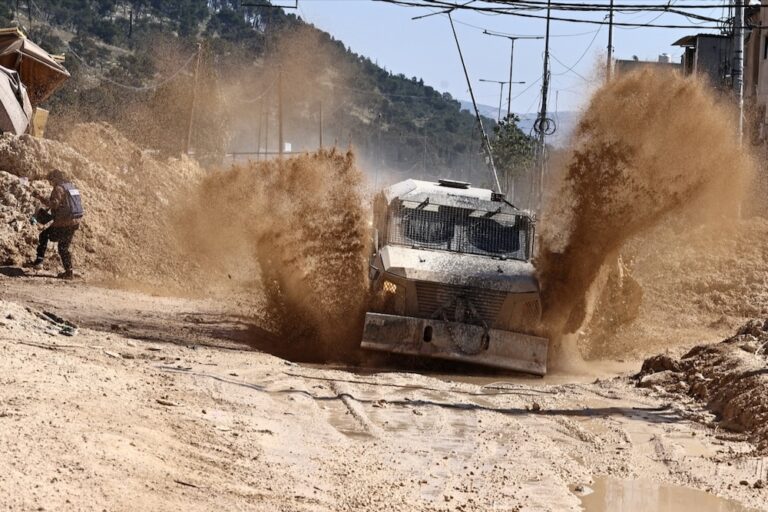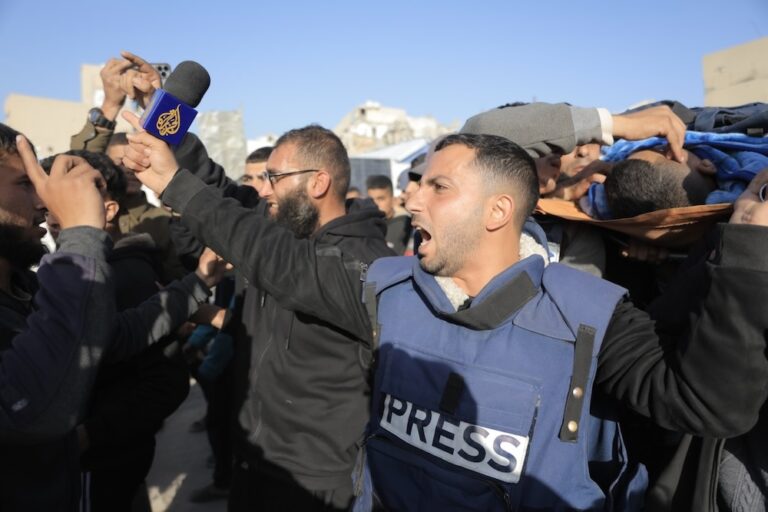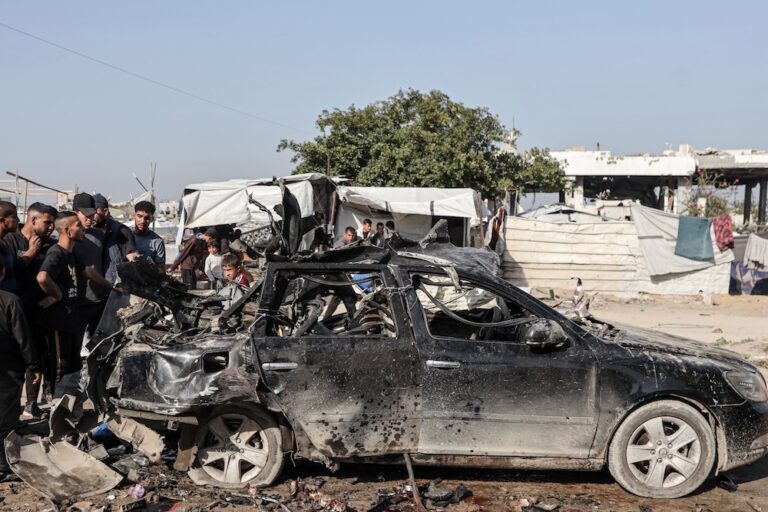Human Rights Watch calls on Palestinian authorities to hold their security forces to account for abuses and urges foreign donors to condition aid to security forces on concrete accountability measures.
(Human Rights Watch/IFEX) – Ramallah, April 6, 2011 – Severe harassment by Palestinian Authority and Hamas security forces targeting Palestinian journalists in the West Bank and Gaza has had a pronounced chilling effect on freedom of expression, Human Rights Watch said today. In a new report, Human Rights Watch called on Palestinian authorities in the West Bank and Gaza to hold their security forces to account for systematic, severe abuses and urged foreign donors to the Palestinian Authority (PA) to condition aid to security forces on concrete accountability measures.
The 35-page report, “No News is Good News: Abuses Against Journalists by Palestinian Security Forces,” documents cases in which security forces tortured, beat, and arbitrarily detained journalists, confiscated their equipment, and barred them from leaving the West Bank and Gaza.
“Palestinian security forces are becoming notorious for assaulting and intimidating journalists who are just trying to do their jobs,” said Joe Stork, deputy Middle East director at Human Rights Watch. “Both the Palestinian Authority in the West Bank and Hamas in Gaza need to end these blatant attacks on free expression.”
In the West Bank, reported incidents of official harassment of journalists by PA security services temporarily spiked during Israel’s offensive in Gaza in December 2008 and January 2009, but the overall trend has continued to worsen. According to one rights group, the Center for Development and Media Freedoms, the number of physical attacks, arrests, detentions, arbitrary confiscations of equipment, and other violations of journalists’ rights by Palestinian security forces increased in both Gaza and the West Bank in 2010 by 45 percent over the previous year.
The report, based on interviews with Palestinian journalists, journalist syndicate representatives, and PA officials, focuses on seven cases of journalists who were abused by PA security forces, and documents two cases of abuse by Hamas internal security forces in Gaza, where the situation for journalists is also dire. Abuses by Hamas in Gaza as well as by Israeli military forces throughout the occupied Palestinian territories will be the focus of future reporting, Human Rights Watch said.
In recent days, Hamas internal security services have repeatedly violated the rights of journalists covering popular demonstrations in Gaza against the political split between Hamas and the Fatah-led PA, Human Rights Watch said. For example, journalists told Human Rights Watch that on March 19, 2011, around 15 Hamas plainclothes security forces raided the offices of the Reuters news agency bureau in Gaza, smashed computers, and beat journalists, after pointing a gun at one of them and threatening to throw another out of a window. In another case, a reporter for the Al Quds radio station told Human Rights Watch that on March 27 Hamas police threatened, insulted, and detained him for more than an hour immediately after he had broadcast a report criticizing Hamas health officials. Security forces accosted him in a morgue where he had reported on a man, supposedly killed by an Israeli military attack, who was discovered still to be alive.
Since Hamas’s takeover of the Gaza Strip in June 2007, the majority of abuses against journalists in both the West Bank and Gaza have been related to tensions between the PA and Hamas, the report found. In the West Bank, the primary targets are journalists whom PA security services suspected of working for television, radio, websites, and newspapers seen as favoring Hamas or other Islamist groups such as Islamic Jihad, or are otherwise critical of the PA.
In one case documented in the report, a PA military court in the city of Jenin sentenced television journalist Tariq Abu Zeid, 34, to a year-and-a-half in prison despite two civilian court rulings ordering his release. Abu Zeid was the northern West Bank correspondent for the Al Aqsa television station, and had worked for the Gaza-based Al-Risala newspaper, both of which are considered to be pro-Hamas.
PA security services have also targeted independent journalists suspected of working on reports that might be critical of the PA. Security officials from the PA detained Muhannad Salahat, a freelance journalist and filmmaker, for 14 days in March and April 2010 without charging or notifying him of the reason for his arrest. Security officials interrogated him for days about whether he was preparing a documentary on the PA for Al Jazeera, the satellite television channel which had been critical of the PA and which the PA saw as pro-Hamas. PA security services detained Salahat for another 10 days in May 2010, and Jordanian intelligence officers later prevented him from traveling from the West Bank to Jordan, saying that he required special clearance from the PA before he could travel.
The majority of abuses documented by Human Rights Watch and reported by local rights groups involved the PA’s Preventive Security agency and General Intelligence Services, and the detention of civilian journalists by the PA’s military judiciary. In a positive recent development, the military judiciary has said it would stop exercising jurisdiction over civilians, although many civilians are still detained by the military.
Overall, the increasing number of alleged abuses against journalists takes place in the context of virtual impunity for serious human rights violations generally by PA security service officials, Human Rights Watch said. In total, Palestinian rights groups reported more than 200 allegations of torture by PA security agencies in 2010 – up from 164 complaints in 2009 – yet the courts have criminally prosecuted security officers for abusing detainees in only one case; a military court acquitted all five of the accused in July 2010.
Human Rights Watch cannot point to instructions from PA leaders to the security services directing them to commit these violations, but the utter failure of the PA leadership to address the prevailing culture of impunity for such abuses suggests that they reflect government policy.
The United States provided $350 million to the PA for security and program assistance in 2010, in addition to $150 million in direct budgetary support, while the European Union gave the PA more than €230 million ($315 million), including for security assistance. Human Rights Watch called on the US and the EU to condition support for all PA security agencies on the PA taking effective steps to investigate, prosecute, and punish security officers responsible for serious abuses.
In Gaza, Hamas internal security agents have summoned critical journalists for questioning, which the journalists interpreted as a form of intimidation, and government officials called some journalists to warn them that their coverage was “slanted” or “biased.” In one case, Hamas security services harassed a Gaza-based journalist for the pro-Fatah Al-Hayat al-Jadida newspaper, repeatedly visiting her home and threatening her over the course of three months in 2010. In another case, the Hamas Ministry of Interior summoned a journalist who published an article on torture by Hamas authorities in secret detention facilities, threatened to take legal action against him if he did not publish an apology for the article, and warned him to correct his “biased” reporting.


